#roud song index
Text

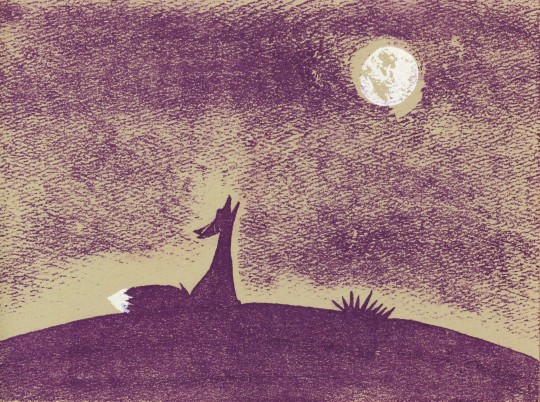
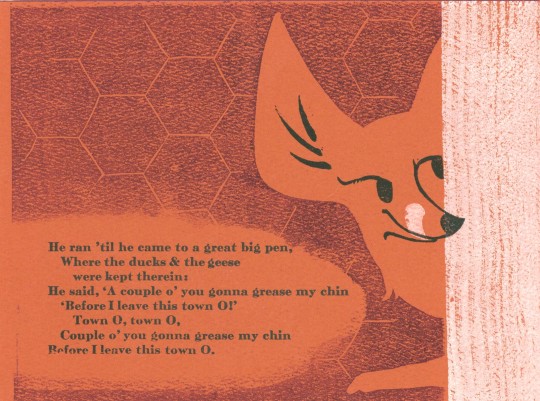


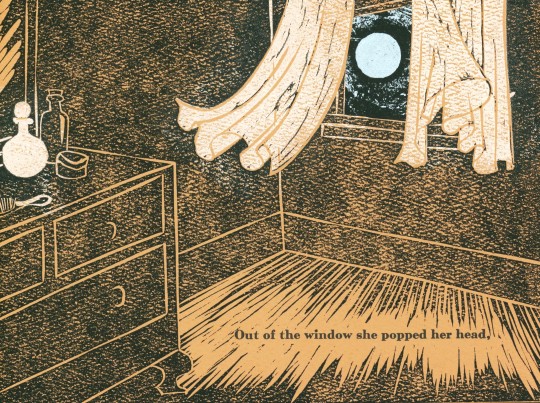


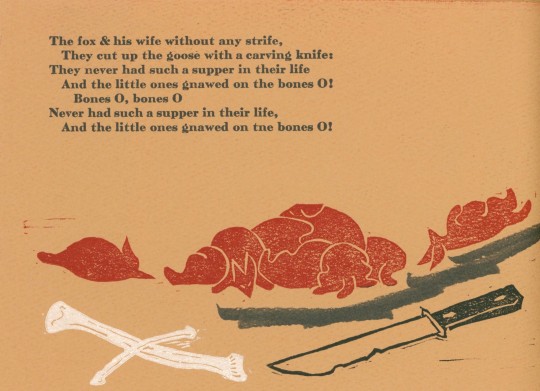


It's Fine Press Friday!
Today's book includes text from an old English folk song with prints by Polly B. Johnson of the Press of the Unseen Unicorn in San Antonio, Texas entitled The Fox. The Fox is a traditional English folk song, the earliest versions of which are from the 15th century and written in Middle English. It is number 131 in the Roud Song Index. This song has also been used and modified throughout the modern age, and has been covered by popular musicians and groups from 1950s to today.
The story is about a fox that goes into a town to terrorize the people and animals living there, while also gathering food for his family living outside the town limits. As the fox goes back to his family, the children exclaim about how wonderful the food he has gathered from the town is, and request that he go back frequently for more exploits.
The Fox was printed with hand-set Masterman type using a Golding Pearl Letterpress on Teton Text Paper, except for the black paper, which is Canson Mi Teintes paper, in an edition of 50 copies. The prints were made using linoleum, wood, and torn chipboard. The cover is made of a rough woven cloth and includes a bone that was boiled, washed, and soaked in Clorox, and dipped in shellac. Our copy is another gift from the estate of our late friend Dennis Bayuzick.
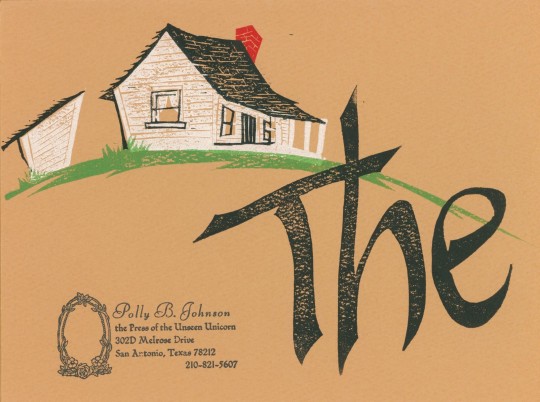
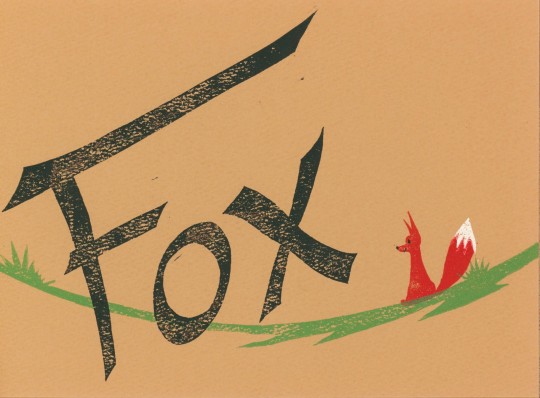
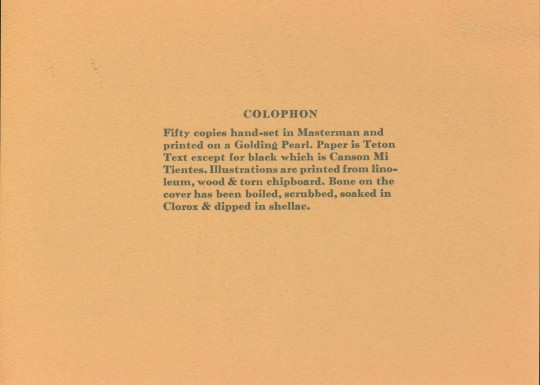
View another book by Polly B. Johnson.
View other books from the collection of Dennis Bayuzick.
View more Fine Press Friday Posts.
– Sarah S., Special Collections Graduate Intern
#Fine Press Friday#fine press fridays#Polly B. Johnson#Press of the Unseen Unicorn#The Fox#english folk songs#folk songs#fine press printing#fine press books#fine press publishing#Masterman type#teton text paper#canson mi teintes paper#linocuts#woodcuts#chipboard print#medieval folk songs#15th century folk songs#roud song index#roud 131#Dennis Bayuzick#Sarah S.
121 notes
·
View notes
Text
new reblog game put in the tags YOUR traditional folk song and who performs your favorite version(s); i’ll go first mine is hares on the mountain (roud 329), and i love lankum’s cover and faoileán’s cover (both of which are inspired by the definitive davy graham/shirley collins version)
#including the roud index number is optional#anyways; folkies rise up i want to know your faves#my other songs are arthur mcbride and mary and the soldier both of which are DEFINED by paul brady
745 notes
·
View notes
Text
EP Review: Cruel Mother - Cut Down For The Earth (Self Released)
London-based folk doom band Cruel Mother are due to release their debut EP, Cut Down For The Earth, on the 12th April 2024.
Formed beneath the tolling of the Bow Bells in East London, Cruel Mother take their lyrical inspiration from printed broadsides and the folk song corpus, particularly the rich tradition of English murder ballads. The band was first conceived in 2022 and has existed in its…

View On WordPress
#black sabbath#Bow Bells#Cruel Mother#Cut Down For The Earth#Doom#Down The Greenwood Side#English murder ballads#Fairport Convention#Folk#Green Lung#John Barleycorn#London bands#London metal#Maryland Metalfest III#My Name is Death#Oranges And Lemons#Pentangle#Skyclad#Steeleye Span#Stoner Doom#The Red Barn#The Roud Folk Song Index#The Rould Folk Song Index#Will O The Wisp
0 notes
Text
i love you folk music, i love you roud index, i love you banjo, i love you songs with a million regional versions, i love you indigenous instruments, i love you murder ballads, i love you oral story telling, i love you inconsistent names, i love you so many verses oh my god so many verses. i love you folk music
2K notes
·
View notes
Text
Harry McClintock - The Big Rock Candy Mountains
1928
"The Big Rock Candy Mountains", first recorded and copyrighted by Harry McClintock in 1928, is a country folk song about a hobo's idea of paradise, a modern version of the medieval concept of Cockaigne. McClintock said that he wrote the song in 1895, based on tales from his youth hoboing through the US while working for the railroad as a brakeman. It is catalogued as Roud Folk Song Index No. 6696. Before recording the song, McClintock cleaned it up considerably from the version he sang as a street busker in the 1890s. Originally the song described a child being recruited into hobo life by tales of the "big rock candy mountain".
The song was not popularized until 1939, when it peaked at #1 on Billboard magazine's country music charts. It achieved more widespread popularity in 1949 when a sanitized version intended for children was re-recorded by Burl Ives.
The 2000 film O Brother, Where Art Thou? uses "The Big Rock Candy Mountains" in the opening credits.
The song "Candy Mountain Cave", from Charlie the Unicorn, parodies it to the tune of the "Clarinet Polka".
"The Big Rock Candy Mountains" received a total of 65,4% yes votes!
youtube
800 notes
·
View notes
Text
1.
The Roud Folk Song Index lists it as the 39th Child Ballad. Comparisons to be made to Type 425 in the Aarne-Thompson-Uther Index, under the entry “The Search for the Lost Husband.” TvTropes.com has more to say on the page titled “Shapeshifting Lover.” A story iterated upon in many forms. A young woman, almost always a woman, sometimes virginal, is wedded, or falls in love with, or is taken away by a man under some sort of curse. He is horse. Or a lindworm. Or a wolf. Sometimes only at night. Sometimes only when the fairies who cursed him make him so. He is a Beast, she must undo whatever evil makes him so, normally through a kiss, true love, wedding him, or, in some of the less sanitized versions, simply sex.
1.
The first time they hooked up he cried afterwords, which she didn’t understand at the time. They were sophomores in college. It wasn’t her first time. It should have been casual. It was up until he cried in the morning. She felt so bad that she suggested they get breakfast together, when she had simply meant to leave.
At breakfast he calmed, he talked about his life. Quiet, nerdy, hiding in his hoodie. There was something vulnerable there, and she liked it. She gave him her number after.
2.
Later thinkers and writers have revisited this trope. Sometimes it is played straight, depicted on the screen by Disney. Sometimes this is (falsely I would argue) called Stockholm Syndrome. Sometimes this is, it must be said, simply used for purposes of sex and titillation. I think, however, that the continued persistence of this motif in media, it’s emotional resonance, demands further explication of its longevity. What about this appeals to us in the modern day, when we (ideally) can no longer ascribe to it a moral of young women being forced to accept arranged marriages?
2.
They’re a few months into their time dating, after long arguments about that label, when the crying returns. This time no longer after sex, but she feels the emotion is the same. You should leave me, he says. Break up. You should do it now before I hurt you, he says.
And she, not wanting to point out that she is bigger and stronger than he is, gently asks why he says something like that? In there time together he has been nothing if not careful. Thoughtful. Kind. One of the most soft and charming people she knows. He cannot explain it in any satisfying way. He simply insists that there is something dark inside him. Something he has sought to deny far too long, and will not be able to deny forever. That if she stays she will be hurt, simply as a function of loving him. He will one day lose the fight against himself.
She does not know what to do but hold him.
3.
I think some of the appeal of this trope can be found in reference to another motif of our pop cultural mythos. That of the werewolf.
We are used to seeing werewolves depicted from the viewpoint of the hunted. But there is perpetually the question of what such a transformation looks like from the viewpoint of the animal itself. A human transforming into a beast demands of a human audience that we consider what it must be like to monster. To be capable of hurting those we love. And yet, I at least wonder, if we are capable of hurting those loved ones, do we not still hope that they will love us as we transform? As we become different, monstrous in shape and utterly unknown even to them?
3.
They graduate. Together. Move into an apartment above a Taiwanese restaurant. She gets a shitty job that has health insurance for them both. He does commission from home. It’s not perfect. There is some part of him he never shares and she does her best to make peace with that. To accept that wherever his mind goes when he is watching her put on a dress, do her make up, whatever he ponders while watching the women passing by the street outside, or after they have sex, that is something he has chosen not to share.
But instead they share popcorn. And bills. And shitty inside jokes. And that time they got accidentally drunk at his mothers remarriage to Craig (fucking Craig amiright?) and got found by the staff of the hotel whose ballroom she had rented, having passed out near the punch bowl.
It’s a life. It’s their life. She tries to give him space within it.
4.
Consider again the Ballad of Tam Lin. The idea of Janet in the woods, holding onto her lover as wicked fairies transform him. To something ice cold. To something burning hot. To a horrible slimed thing writhing in her embrace. To a snarling wolf-monster, a beast of wicked claws and gnashing teeth.
Who has, at one time or another, when circumstances reveal that which we keep hidden, felt like that?
4.
She gets home unexpectedly early one spring afternoon in her late twenties. Janet from accounting somehow set fire to a microwave, which set off the sprinklers, and no one could get anything done that day. A small treat, and it validates her admittedly flash-judgment of Janet.
And as she unlocks the door, flowers in hand, she finds him in front of the closet they share, and understands the secret that has been kept from her for almost a decade.
5.
And then of course, the tales and legends end. Normally in the curse being lifted, the lover being returned to normal. Beast is a beast no more, the Lindworm is again a prince, Tam Lin may leave the woods a man. A simple ending to a simple story.
But for us living in reality? Outside of the tidy constraints of fiction? Perhaps there is no ending. Perhaps we remain a beast, remain a wolf, remain cursed, and monstrous and strange. Perhaps we endlessly transform into new, and more twisted shapes, and have only hope that our loves will hold us nonetheless. That even if we become something that may hurt them, something they may not understand, they will still love us.
5.
It is hard. It would be nice to say there are not challenges. She always thought she was bi, but the label of straight was easy, and she never had to examine it when she was with him. She keeps on stealing her dresses.
There are good times too. Times where she looks at this woman still becoming, someone she had loved for a decade and still barely knows, and sees how brightly she smiles, and feels so proud.
But it is above all else hard. The crying does not go away. Estrogen works wonders, but cannot stop dysphoria, and hurt, and pain. It is hard to love her. But she is trying. And when the fights over labels and new boundaries and shifting emotions break out, or the dread comes, or the weeping, she does what she can.
She holds her partner, no matter the form she takes.
137 notes
·
View notes
Note
Hello, sorry if you’ve already said this before, but where are you finding your folk songs? like a specific book or website? (i’m always looking to expand my collection and i have never heard of long lankin before)
thanks in advance :D
Hey!!
So originally I just got folk songs from ones I heard growing up, because my dad was fond of folk music & played me a number of bands I'm still fond of. A lot of ones I come across now are still basically from rabbit holes of songs I fell down with these.
However! If you're looking for more thorough catalogues of folk songs, the main ones you come across are:
Child Ballads -- These are only ballads. They were collected by Francis James Child in the 19th century, and they're all numbered, so if you've seen songs mentioned as like "Child 93" that's why, especially because a lot of these songs don't have consistent names. They're primarily collected in his 5 Volume book The English and Scottish Popular Ballads (Vol. 1, Vol. 2, Vol. 3, Vol. 4, Vol. 5), linked there to where you can read it for free. The great thing about these is it will list all the variations of the songs he found as well as where he found them, with a little scholarly discussion of the song and its history on each. As someone that loves like. the process of transmission & the context of songs this is very appealing to me personally. It is old fashioned in its scholarship etc though.
Roud Folk Song Index -- This is a Much larger more modern index of songs: for comparison there are only 305 child ballads, whereas the Roud Index has nearly 25,000 songs (including all the Child ones). These also have numbers, so you'll often see something like "Child 93; Roud 6" where they overlap, or "Roud 2989" where they don't. Obviously because it's so big there's no book for them all, and likewise not as much commentary on individual songs. You can search them by number here, or by subject (!!!) here. The fact that this index exists is really cool, and especially that you can search it like that, although sometimes I find it a bit hard to get what I want, or have it layed out as clearly as in Child, I think just because it's so big.
This isn't really a major index like Child and Roud so you won't get it cited anywhere, but Mainly Norfolk is an index of folk songs mainly focusing on more modern recordings of the songs and their different variations. So for example you'll get a page for a songs and it'll tell you all the bands that have recorded it, and the differences in their lyrics, and what they said about the song on the back of the CD, etc. Which is fun for me particularly because I'm often accessing them through having listened to modern recordings and I'm curious about that.
You can also find various collections of broadsides and things (Roud includes a lot of broadsides I believe but if you want to look at them specifically), one of my favorites is the Bodleian Libraries online collection, which even has images of a lot of them I believe. This is fun if you like print sources.
And then a lot of these I'm just searching in Youtube as well, haha. You never know what old man recording a song he heard from his grandmother with 10 views and 2 likes you might find.
I hope this was helpful & answered the question! I will say I don't have any sort of expertise in this, it's entirely based on me just fooling around, so if anyone more knowledgeable than me has anything to add or any corrections to make feel free!
68 notes
·
View notes
Text
roud folk song index poll tournament could be rly fun but also there are over 30 thousand songs in there
#obv it would have to be submission based. & i doubt i could comfortably run it alone but. hmmmmm#soapbox
17 notes
·
View notes
Text
I don't think Matty Healy is a celebrity or Taylor Swift's boyfriend with a name like that. That's a character from the Roud Folk Song Index or from Wordsworth and Coleridge's Lyrical Ballads
49 notes
·
View notes
Text
*looking out the window* damn it's like Roud Folk Song Index #3634 out there!
15 notes
·
View notes
Text
In which I trip over 30 seconds'-worth of incidental instrumental music, fall very very far down a mudcat research hole, and emerge with a compiled playlist an hour and a half long of every song I can find using the same tune.
In my usual magpie-manner, I've been stricken with the urge to note down every identifiable bit of folksong scattered throughout the Sharpe series (thank you, John Tams, et al.), so during my most recent re-watch I kept notes as I watched- most I knew, the few others I could reverse search by phrases of lyrics, and the only real stumbling blocks were any un-named instrumental ones since I have a terrible ear for tunes I can't attach the mnemonic of lyrics to.
[If you only care for the playlists, scroll to the ✨️ at the bottom; if you want to look at my brain under a microscope, keep reading] [7 Feb, 2023 eta: the playlist has now more than doubled in length, both in # of songs and run-time]
In Siege though, starting at about 29:15, there's a brief bit of plaintive fiddle I did recognise as being the tune used by Judy Collins and others for 'Farewell to Tarwathie'. Which led, when I came to transferring my notes to playlist-form, to searching up the name of the tune itself so I could find an instrumental rendition, with my first port-of-call being the ever-faithful mainlynorfolk index, which quoted A.L. Lloyd as calling the tune 'an old favourite, best known in connection with the song called 'Green Bushes'. Which, being Bert Lloyd, we take with a substantial grain of salt.
So off to the mainlynorfolk index entry for 'Green Bushes'; not a lot of additional info there, so thus-armed, over we go to the Fresno State Trad Ballad Index entries, and their cross-references and then...
From which, the chain looked something like this: Mainlynorfolk -> Trad Ballad Index -> Scots Language Centre -> Trad Tune Archive -> Mudcat forums(1)
And then, through a marvelous stroke of serendipity, and the sole reason you're not currently reading the dissertation-length essay I was writing in my head; I stumbled across this article which is the exact manifestation of that incipient train of thought/red-string corkboard:
Song Archeology: From "Earl Douglas' Lament" To "Farewell Angelina"; The Long And Twisted History Of An Old Tune Family by Jürgen Kloss
So I could then simply get on with the playlist-making. Thank goodness for equally pedantic people in this world doing the hard work for me. (definitely do go read Kloss's article tho)
[(1) Which is fairly well what my usual oddly-specific folk playlist forays look like, only scanning for breadth rather than depth in their case. Mainlynorfolk is excellent for finding recordings of songs; the Trad Ballad Index for figuring links between songs/tunes themselves; and Mudcat, my beloved, for decades-old forum threads on particular themes and genres. Add to those the other *mumble*-dozen sites and books in my 'Folk Music Resources' bookmarks folder, such as the VWML Roud Index, and I can get real granular in my playlist-themes.]
(incidentally, 'Wild Rover' also scans near-perfectly to the tune and vice-versa 'Tarwathie''s lyrics to 'Wild Rover', though I don't think the tunes are actually that similar; I also keep slipping into 'Sweet Betsy From Pike/Vilikens and His Dinah' whilst humming it, though the metre there is entirely different; and i could halfway believe an evolutionary relation to the classic come-all-ye tune such as 'Blow-ye-winds-westerly/Fish in the Sea')
So anyway, the upshot of this is I now have two new playlists to show for it: the intended Sharpe's Soundtrack one [here] and the subsidiary hour-and-a-half 3-hours+ tune family compilation [here] ✨️
Sources:
DigiTrad: https://mudcat.org/@displaysong.cfm?SongID=8972
Kloss's site: https://www.justanothertune.com/html/tarwathie.html
Mainlynorfolk: https://mainlynorfolk.info/lloyd/songs/farewelltotarwathie.html ; https://mainlynorfolk.info/joseph.taylor/songs/greenbushes.html
Mudcat forum threads: https://mudcat.org/thread.cfm?threadid=40025 ; https://mudcat.org/thread.cfm?threadid=93528
Scots Language Centre: https://www.scotslanguage.com/articles/node/id/400
Trad Ballad Index: https://www.fresnostate.edu/folklore/ballads/DTtarwat.html ; https://www.fresnostate.edu/folklore/ballads/R061.html ; https://www.fresnostate.edu/folklore/ballads/LP02.html ; https://www.fresnostate.edu/folklore/ballads/FJ180.html ; https://www.fresnostate.edu/folklore/ballads/R740.html
Trad Tune Archive: https://tunearch.org/wiki/Annotation:Kennet%27s_Dream ; https://tunearch.org/wiki/Annotation:Johnny_Armstrong
[If any links cease to work, I've added them all to the Internet Archive Wayback Machine as well]
#particularly rapid unintelligible patter#i may have lost my mind slightly#it's been a while since i went so deep into the hyper-focus zone#i blame john tams' choice of fiddle tune that he absolutely did not put half so much thought into as this post. although maybe he did.#this post mostly for my own future reference but ah if you're interested enjoy#sharpe's rifles#er. increasingly tangentially.#anyhow this is how i so employed yesterday evening#[next day edit: we have now doubled in length; both no. of songs and play-time]#folk music
33 notes
·
View notes
Note
what does gloam mean 😭
twilight! - or to become twilight. per merriam-webster:
the time of day immediately following sunset
it's originally an old scots word, now archaic. original form gloaming predates gloam by about four centuries (see: gloming/glomyng), and is mostly heard still in famous songs like Loch Lomond, (number 9598 in the Roud Folk Song Index). i like this medley version:
gloam chomsky as my blog name is a pun on the linguist noam chomsky. gnome chomsky's been done. here's a picture of loch lomond from this summer:

hope this helps!
#asks#why are you crying op???#i hope you like this unnecessary amount of information and background!#language i love thee so
14 notes
·
View notes
Text
There is "Roud Folk Song Index"
And before you ask: #13027
2 notes
·
View notes
Text
Detective Comics


From wikipedia: "Who Killed Cock Robin" is an English nursery rhyme. It has a Roud Folk Song Index number of 494.
Kids today know more of Batman than Cock Robin.
2 notes
·
View notes
Text
do you ever think about things like the child ballads or the roud folk song index and go. man
0 notes
Text
@chelseahotel2004 cleo you’ve expressed interest what is your wisdom
9 notes
·
View notes